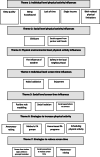Influences on physical activity and screen time amongst postpartum women with heightened depressive symptoms: a qualitative study
- PMID: 33992072
- PMCID: PMC8126115
- DOI: 10.1186/s12884-021-03847-w
Influences on physical activity and screen time amongst postpartum women with heightened depressive symptoms: a qualitative study
Abstract
Background: Postpartum women are at higher risk of depression compared to the general population. Despite the mental health benefits an active lifestyle can provide, postpartum women engage in low physical activity and high screen time. Very little research has investigated the social ecological (i.e. individual, social and physical environmental) influences on physical activity and screen time amongst postpartum women, particularly amongst those with depressive symptoms. Therefore, this study sought to examine the influences on physical activity and screen time amongst postpartum women with heightened depressive symptoms.
Methods: 20 mothers (3-9 months postpartum) participating in the Mums on the Move pilot randomised controlled trial who reported being insufficiently active and experiencing heightened depressive symptoms participated in semi-structured telephone interviews exploring their perceptions of the key influences on their physical activity and screen time across various levels of the social ecological model. Strategies for promoting physical activity and reducing screen time were explored with participants. Thematic analyses were undertaken to construct key themes from the qualitative data.
Results: Findings showed that postpartum women with depressive symptoms reported individual (i.e. sleep quality, being housebound, single income), social (i.e. childcare, social support from partner and friends) and physical environmental (i.e. weather, safety in the local neighbourhood) influences on physical activity. Postpartum women reported individual (i.e. screen use out of habit and addiction, enjoyment) and social (i.e. positive role modelling, social isolation) influences on screen-time, but no key themes targeting the physical environmental influences were identified for screen time. Strategies suggested by women to increase physical activity included mother's physical activity groups, home-based physical activity programs and awareness-raising. Strategies to reduce screen time included the use of screen time tracker apps, increasing social connections and awareness-raising.
Conclusions: Amongst postpartum women with heightened depressive symptoms, influences on physical activity encompassed all constructs of the social ecological model. However, screen time was only perceived to be influenced by individual and social factors. Intervention strategies targeting predominantly individual and social factors may be particularly important for this high-risk group. These findings could assist in developing targeted physical activity and screen time interventions for this cohort.
Keywords: depression; determinants; mental health; physical activity; postnatal; sedentary behaviour; strategies.
Conflict of interest statement
The authors declare that they have no competing interests.
Figures
References
Publication types
MeSH terms
LinkOut - more resources
Full Text Sources
Other Literature Sources
Medical


